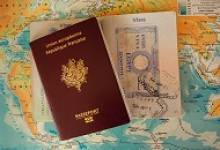International Student Visas in Italy
 Posted date: 23 Jun 2020
Posted date: 23 Jun 2020
Student visas are provided in Italy by Italian Embassies or Consulate-General offices in your home country. Students from the European Union (EU) or from EFTA countries may enter Italy with a valid passport or EU ID card and may stay in Italy for the duration of their studies without a visa. Upon admission, however, in order to acquire a residence permit, EU students must register at their nearest Questura department (police station) if their study is longer than 3 months. Unless you are a student outside the EU, you would be expected to receive a student visa prior to entering Italy. There are two forms of student visas provided in Italy, depending on the length of the research programme:
- Visa type C: Short-stay visa or travel visa valid for one or more entries and for a period not exceeding 90 days
- Visa type D: Long-stay visa valid for more than 90 days
Regardless of the type of visa you need, start the process well in advance of your expected entry date to Italy, because the processing period can be lengthy. For arrange a visa appointment, you can contact the nearest Italian embassy or consulate as soon as you receive a letter of entry from the Italian agency, as appointments appears to be difficult to get by. The processes for applying for Italian student visas are subject to adjustment, so calling the Italian Embassy for clarification to check the latest visa conditions is still worthwhile. When you enter Italy via form D visa, you will also be expected to announce your arrival to Questura station within 8 days of your arrival in Italy. You must have a residency permit card sent to you to confirm your status as a legal resident within the state. Students may need to request any or more of the following documents as part of their student visa application to study in Italy:
- A valid passport with at least two blank visa pages and valid for at least three months beyond the research programme 's planned end date;
- A letter of approval from your Italian institution;
- Completed visa application;
- A map of your path to and from Italy;
- Proof of the Italian or English language proficiency (depending on the language of the research program);
- Evidence of ample financial capital to support yourself (from €450 to €515 a month);
- Proof of proper hosting in Italy;
- Proof of sufficient compensation coverage; and
- Proof you can pay the payment fee associated with it.
Foreign students who are EU citizens have the freedom to work during their studies in Italy but during normal study times should not reach 20 hours of work a week. However, during holiday periods you can take up more hours. During their studies, non-EU students can work if they obtain a work permit which a job needs offer from an employer based in Italy – a slightly complicated procedure! Processing times vary from region to region but on average around two months. International students from outside the EU do not plan on finding a job immediately after their arrival in Italy, concentrating on finding used to your daily life in Italy.
Posted By

GSP Admin




